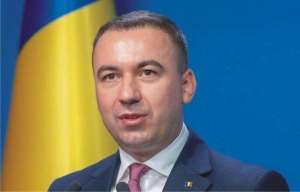Reporter: Tax evasion is one of the most discussed topics in Romania, and its eradication is a constant priority for the government programs. What stage is this phenomenon in?
Felicia Pop: Tax evasion is present in almost all areas of activity. Tax evasion has significantly increased on intracommunity trades. It is an area which many have tried to use and they have succeeded to a good degree. The intracommunity trades and the trading with excisable products are currently the most affected by tax evasion.
Reporter: What is the most commonly used method to avoid the law, in these areas?
Felicia Pop: Tax evasion takes various forms. There is a simulation of intracommunity trades, in order to avoid the payment of VAT, and then, the merchandise is recorded on the books of shell companies that disappear after the first trades (by the time we get to investigate them, they disappear), in order to avoid the payment of taxes. Usually, very low prices are used at the time of the purchase, and then, along the circuit, prices are hiked tens of times, to allow the deduction of VAT...
The imagination of tax evaders is limitless: there are many circuits for the merchandise; there are situations where on paper, a merchandise goes through 5-10 intermediaries, on paper, so its track gets lost, regardless of whether we are talking about internal transactions, or intracommunity purchases/deliveries, or imports. We are trying to conduct much more extensive analyses, based on the information we have. We are now trying to change the law no. 31 concerning companies, so we can more rigorously track the transfer of shares, between shareholders, as well as the filings for insolvency. Usually, the big tax evasion is done by companies without any assets, which are created, make a few transactions, transfer the money outside the country and then disappear. We are trying to use various forms of oversight and control, but for now, we are very far from getting a full handle on this phenomenon.
Reporter: What is missing for the phenomenon to be controlled?
Felicia Pop: It takes a new attitude when it comes to investigations, far stricter laws, and adequate equipment, as well as forms of incentives and control of the fiscal commissioners or inspectors. We should have a much better implemented system, with clearly defined responsibilities, with wages according to the responsibilities, so that the people doing the audit are not exposed to temptations, and the moment the law is broken, the punishment should be maximal. The law of the civil servants should also be adjusted, because there are also some amendments concerning their hiring, and the possibility of their dismissal, etc.
Reporter: According to the report of activity of the Financial Fraud Squad, on the first semester of 2013, some of the efficiency ratios have fallen quite a lot. How would you explain this situation?
Felicia Pop: In 2012, according to the strategy of the ANAF for the fighting of tax evasion, it was decided that the Financial Fraud Squad would be involved in the monitoring of intracommunity trades.
According to this working procedure, which involves the monitoring of high-risk merchandise shipments, an important weight of the resources of the Financial Fraud Squad (40-50% of our commissioners) has been permanently involved in this action, to the detriment of other types of investigations (operative, or thematic). This has led to a drop in the number of probes and implicitly, in the reduction of the levied fines. However, it must be considered that the monitoring has led to an increase of the receipts of the state budget, an increase which was especially significant when it comes to VAT.
Another cause of the decrease in the number of audits was the drastic cut of the number of employees, by over 350 commissioners. In a nutshell, in June 2011, out of the 1,800 commissioners about 1070 were left, and there are many vacant positions which were downsized. The Financial Fraud squad now has 1140 commissioners; their number has increased because some of those who have been laid off have filed lawsuits in court and they have been reintegrated.
Beyond all of these drawbacks, our qualitative ratios have grown in 2012. Thus, even though the number of audits was lower last year, our results were about 40% higher than those of 2011. We are hoping that this evolution will remain the same this year.
Reporter: Could you give us some concrete numbers?
Felicia Pop: Yes, we seized 194 million lei worth of goods, last year, up 44% over the previous years, and the value of the unpaid taxes for 2012 is 3.8 billion lei, up 35.7% over 2011. This thing has been made possible because the quality of the audits was increased, based on prior tax risk analysis, by considering several factors: lines of business, turnover, financial result, shareholder structure, the prices charged etc.
Reporter: How many audits were initiated by yourselves and how many came from other institutions?
Felicia Pop: We have numerous requests which come from the prosecutors' office, DIICOT, DNA, which we also have to respond to. They have represented about 20% of our activity last year, up over 2011.
When it comes to the requests between institutions, we can appreciate that we have seen significant results. Last year, we have also received and solved 553 requests from the DNA, 180 - from the DIICOT, 234 - from the prosecutors, 4,397 cases notified by the Police, 149 notifications from the DLAF, 4,211 notifications from other structures of the ANAF, 188 from the territorial labor inspectorates and 3,194 from other institutions.
Reporter: What areas did you conduct themed inspections in?
Felicia Pop: We had themed investigations in the food service industry, gambling, bread manufacture, excisable products, agricultural markets etc.
Reporter: There are companies which, even though they have been sanctioned for fiscal irregularities, continue to operate uninhibitedly in the same manner ...
Felicia Pop: These kinds of cases also happen, it's true. For example in the case of companies that are involved in retail, and are required to have cash registers, we investigate them weekly, because there is a high degree of evasion. But there are however situations when we sanction them, their operation gets suspended, and the company disputes the decision in court. According to the legal provisions, the dispute of the report of the probe leads to the suspension of the cause. Still, about 50% of the offenders pay their fines, and most of the companies try to operate legally from then on.
Reporter: What should be done so we can avoid the tax evasion phenomenon and prevent it from occurring so often among retailers?
Felicia Pop: Aside from the punitive measures, prevention methods should play an important part. We should place weight on fiscal education, to have awareness campaigns about the costs and the risks of tax evasion. Investigations should begin with warnings, with smaller sanctions at first, obviously small-scale cases of tax evasion. But it also takes the harshening of tax evasions in the financial and fiscal sector, especially where measures of prevention and fighting yield no results.
Reporter: What segments have the highest evasion segment?
Felicia Pop: Like I was saying, the highest degree of tax evasion is seen on intracommunity transactions. There are certain categories of goods where we have higher tax evasion - vegetables, fruits, flowers, meat products, etc.
Reporter: What are the weak points which facilitate tax evasion?
Felicia Pop: First of all, the areas with intense intracommunity traffic, and then domestic trade. The area most affected by tax evasion is Bucharest-Ilfov.
Reporter: There are voices which say that the largest volumes of merchandise are coming in through the Port of Constanta, and that that is where the biggest tax evasion happens, and yet the audits systematically avoid that area. How would you comment these statements?
Felicia Pop: It is true, for now, we have been unable to focus too much on that area, due to a lack of personnel, but we are working on a strategy of common actions with the customs and the border police.
Reporter: What were the results of the investigations conducted at the border crossing points?
Felicia Pop: As they were involved in the oversight of intracommunity transactions, in 2012, the commissioners of the Economic Fraud Squad have checked 492,519 shipments, of which 118,934 shipments which contained goods considered as having a high risk of tax evasion were sealed and monitored. This measure will continue into 2013 as well, except we are working to improve the procedure, meaning that the monitoring is based on a more rigorous risk analysis.
Reporter: What are your expectations for this year?
Felicia Pop: The investigations will definitely become more numerous in 2013, especially in the areas and sectors considered as having a higher risk of tax evasion, namely trading of excisable products, fictitious commercial circuits, by involving fictitious companies in order to avoid the paying of taxes, the trade of fruit and vegetables, meat, the trading of electronics etc.
As a future fiscal policy, like we have said, measures which must be taken are the amendment of the law no. 31 concerning companies, as the transfer of shares and is more rigorously checked, as well as the amendment of the law of insolvency, so that the moment a company files for insolvency on its own, we get the right to check it and to extend the liability to shareholders as well, or to the administrators which bear the responsibility for the company's default.
Reporter: There are cases when the tax evasion goes hand in hand with corruption, with the biggest, or perhaps the most publicized action being the one where the lawmen of the Vama Giurgiu were uncovered in 2011. Have there been any commissioners of the Fraud Squad caught breaking the law?
Felicia Pop: Yes, we did have cases of corruption ... Even in the Financial Squad we had some colleagues who are being investigated. 24 cases of corruption are currently being investigated or have been tried over the last five-six years. But there are also many cases where in the end, the crime was not proven, and the colleagues in question were reinstated. The raids of Giurgiu have led to two of our colleagues being investigated.
Reporter: What is the biggest problem you are currently facing?
Felicia Pop: Our main problem is personnel: our staff has been cut by 30%, as half of the employees are involved in the monitoring of intracommunity transactions, which are estimated as having a high fiscal risk. We also have many requests from other institutions, as well as many petitions - from individuals or companies, so that we have too little time left for themed or operative investigations.
Reporter: Given these circumstances, are new hirings being considered?
Felicia Pop: There are talks about a new structure of the ANAF. In the first stage, it will be the Fraud Squad and some of the structures of the customs which will undergo reorganization, namely the control and antifraud structure. Under these circumstances, there can be no talk of new hirings.
Reporter: When will this new strategy be implemented?
Felicia Pop: It will start in the beginning of April, and the entire procedure will be completed in 2015.
Reporter: Thank you!
















































